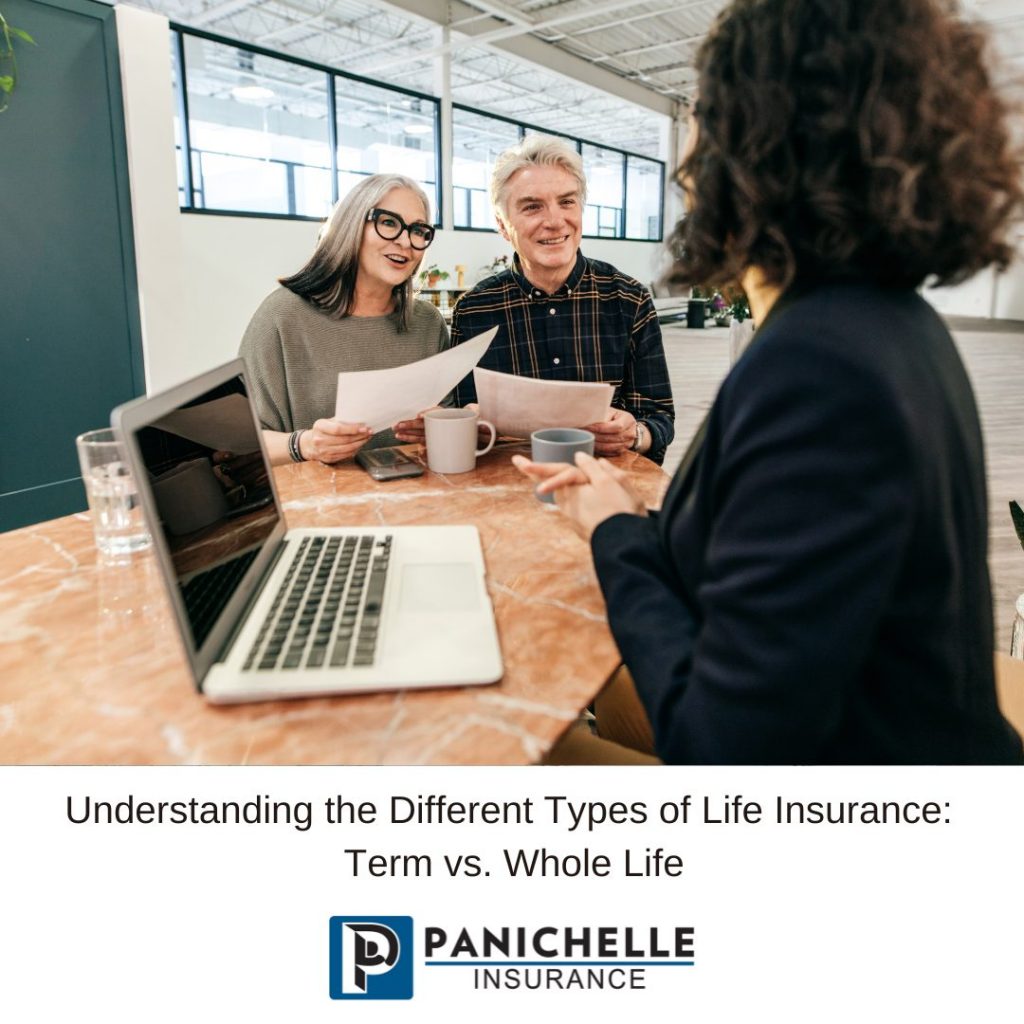At Panichelle Insurance, we understand the importance of safeguarding your family’s future. Life insurance is a crucial element of financial planning, offering peace of mind and financial security to your loved ones. However, selecting the right type of life insurance can be daunting with various options available. Two of the most popular choices are term life insurance and whole life insurance. Here, we’ll break down the differences to help you make an informed decision.
Term Life Insurance
Term life insurance is the simplest and most cost-effective type of life insurance. It provides coverage for a specific term, typically between 10 to 30 years. If the policyholder passes away within the term, the beneficiaries receive the death benefit. If the policyholder survives the term, the coverage ends, and no benefit is paid out.
Pros of Term Life Insurance:
- Affordability: Term life insurance premiums are generally lower than whole life insurance premiums, making it an appealing option for young families or individuals on a budget.
- Simplicity: The straightforward nature of term life insurance makes it easy to understand and manage. There are no investment components or complex terms to navigate.
- Flexibility: Term lengths can be chosen based on individual needs. For instance, you can select a term that covers the duration of a mortgage or until your children are financially independent.
Cons of Term Life Insurance:
- Temporary Coverage: Once the term ends, the coverage ceases, and you may need to purchase a new policy at a higher premium due to increased age or health issues.
- No Cash Value: Term life insurance does not accumulate cash value. If you outlive the policy, you receive no payout or savings.
- Limited Options for Renewal: Renewing term life insurance can be expensive, and some policies do not offer renewal options without undergoing a new medical examination.
Whole Life Insurance
Whole life insurance, also known as permanent life insurance, provides coverage for the entire lifetime of the policyholder, as long as premiums are paid. In addition to the death benefit, whole life insurance includes a cash value component that grows over time.
Pros of Whole Life Insurance:
- Lifetime Coverage: Whole life insurance guarantees coverage for the policyholder’s entire life, ensuring a death benefit is paid out regardless of when death occurs.
- Cash Value Accumulation: A portion of the premium goes into a savings component, which accumulates cash value on a tax-deferred basis. This cash value can be borrowed against or withdrawn during the policyholder’s lifetime.
- Fixed Premiums: Whole life insurance premiums remain the same throughout the policyholder’s life, providing predictability and stability in financial planning.
Cons of Whole Life Insurance:
- Higher Premiums: Whole life insurance premiums are significantly higher than term life insurance premiums. This can be a financial strain for some individuals, particularly younger families.
- Complexity: The cash value component and investment aspects can make whole life insurance more complicated to understand and manage.
- Lower Returns: The investment component of whole life insurance often yields lower returns compared to other investment options, such as mutual funds or stocks.
Key Considerations When Choosing Life Insurance
- Financial Goals: Consider your long-term financial goals and how life insurance fits into your overall plan. If you seek simple, affordable coverage to protect your family for a specific period, term life insurance may be the best choice. If you want lifetime coverage and the ability to build cash value, whole life insurance might be more suitable.
- Budget: Evaluate your budget and determine what you can afford in premiums. Term life insurance offers cost-effective coverage, while whole life insurance requires a higher financial commitment.
- Dependents and Debts: Consider the needs of your dependents and any outstanding debts. Term life insurance can be ideal for covering mortgages, education expenses, and other temporary financial obligations. Whole life insurance can provide long-term security and support for beneficiaries.
Both term and whole life insurance have their unique advantages and disadvantages. The right choice depends on your individual circumstances, financial goals, and budget. By understanding the key differences between term and whole life insurance, you can make an informed decision that provides peace of mind and financial security for you and your loved ones.
At Panichelle Insurance, we are committed to helping you navigate the complexities of life insurance. Contact us today to consult with our knowledgeable advisors, who can help you determine the best policy for your specific needs. Let us help you secure your family’s future with confidence.

